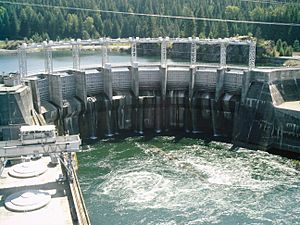Cabinet Gorge Dam facts for kids
Quick facts for kids Cabinet Gorge Dam |
|
|---|---|
 |
|
| Location | Bonner County, Idaho |
| Coordinates | 48°5′12″N 116°3′52″W / 48.08667°N 116.06444°W |
| Opening date | 1952 |
| Construction cost | $47 million |
| Operator(s) | Avista Corp. |
| Dam and spillways | |
| Impounds | Clark Fork River |
| Height | 208 ft (63 m) |
| Length | 600 ft (180 m) |
| Width (base) | 40 ft (12 m) |
| Reservoir | |
| Creates | Cabinet Gorge Reservoir |
| Catchment area | 22,000 sq mi (57,000 km2) |
| Surface area | 3,200 acres (1,300 hectares) |
| Power station | |
| Turbines | 4 turbines; 1 Kaplan, 1 mixed flow, 2 propellers |
| Installed capacity | 230 mw |
Cabinet Gorge Dam is a concrete gravity-arch hydroelectric dam on the Clark Fork River, in the U.S. state of Idaho. The dam is located in the Idaho Panhandle, just west of the Montana border. Cabinet Gorge Reservoir extends into Montana, nearly to Noxon Rapids Dam. The purpose of the dam is for hydroelectricity.
Construction
Construction on the Cabinet Gorge Dam began in 1951 by the Morrison Knudsen Corporation. The Clark Fork River had to be diverted with two coffer dams and speed was necessary because Spring flooding threatened the river diversion and coffer dam integrity. 32 tons of dynamite was used to blast 50,000 cubic yards of rock from the canyon walls in order to prep the construction site. Water was diverted through two 1,000 ft (300 m) tunnels, and a half-million cubic yards of earth was excavated from the site overall. Construction on the dam was complete in 1952 and the reservoir was filled in 1951, half the estimated time.
The dam is currently owned and operated by the power company Avista.
On August 13, 2017, a train derailment dumped more than 3,500 tons of coal on the Cabinet Gorge Reservoir riverbank between Noxon and Heron, Montana.

